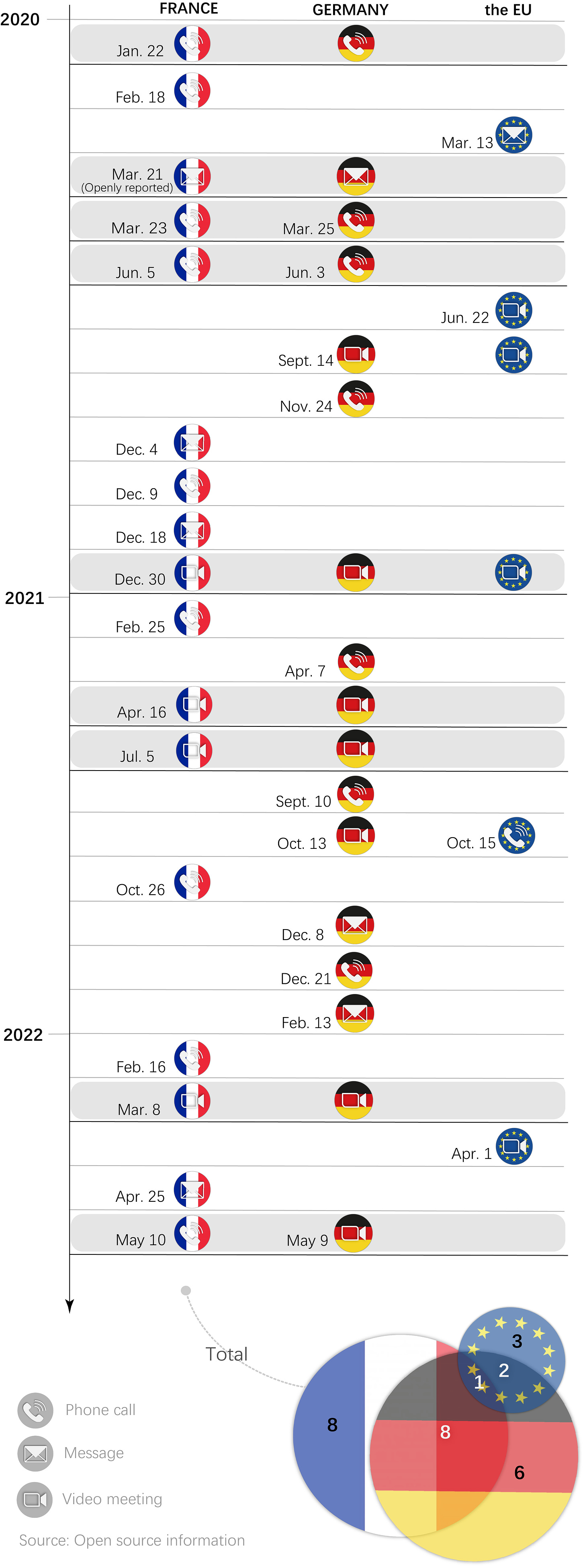One telling detail in Beijing's calls to Paris and Berlin
Beijing likes to conduct synchronized conversation with Paris and Berlin, what does that say about China's Europe policy?
Ever since the outbreak of the Covid pandemic in early 2020, top-level dialogue between China and other countries has nearly always been conducted online.
In combing through these dialogues, communication with two countries stood out among the rest, namely with France and Germany, which were conducted with a high and rare level of synchronicity.
Below is a graph Beijing Channel has made that recorded top-level contacts between China, France, and Germany since in-person diplomacy was discontinued in 2020.
According to this tally, since 2020, China’s leader contacted the leaders of France and Germany on the same day six times, and for an additional three times, the contacts was one or two days apart. The ratio of this synchronized dialogue made up more than half of all top-level communications between Beijing, Paris, and Berlin. That rate would become even higher if routine congratulatory messages were excluded.
An overview of Chinese diplomacy with foreign countries indicated that France and Germany are the only two countries to which China has been reaching out in high synchronicity.
Furthermore, the dialogues with French and German leaders are often early channels China uses to communicate important messages to the international community. For example, in his phone calls with Macron and Merkel on January 22, 2020, Xi outlined China’s efforts to curb the Covid outbreak. And in a video conference with both Macron and Scholz on March 8 this year, Xi clarified China’s position on the conflict in Ukraine.
To better explain this special arrangement on China’s part, Beijing Channel has invited Cui Hongjian, who serves as director of the Department for European Studies, CIIS, to comment.
Disclaimer: The content below reflects Cui’s personal view, not necessarily those of this newsletter, Xinhua, or the Chinese government.
This arrangement is unlikely to be a coincidence. There are three reasons for this synchronicity.
First, the two major powers, France and Germany, play a pivotal role in the EU and European politics. The many synchronized communications between Xi and the two countries' leaders show that China respects the tradition and this reality in European politics and the EU.
Second, it is an approach that France and Germany have signaled to have accepted and promoted. During President Xi’s visit to France in 2019, President Macron invited Chancellor Merkel and other EU leaders to Paris to convene a forum on global governance. This shows that both French and Germany agree with the approach of conducting dialogue with Chinese leaders over major international and regional affairs in sync.
Third, as China develops its bilateral relations with European countries, especially with France and Germany, some in Europe are concerned that China might intentionally exploit the differences between European countries, especially France and Germany, and sow division in Europe. The synchronicity of Beijing’s contacts with Paris and Berlin underscores the fact that China’ has no such intentions.
France and Germany play a fundamental role in the European Union, and each country has its characteristics and strengths. At the same time, the two countries also have strong complementarities, so this is an important reason for China to value the simultaneous development of relations with both countries.
France is currently the only permanent member of the Security Council in the EU, so the coordination between China and France is more about major international and regional issues, especially those related to politics, security, and diplomacy.
On the other hand, Germany is the largest economy in the EU and Europe and China’s largest trading partner in Europe, so Germany’s role in the economic field is irreplaceable. To a certain extent, the basis of China-EU economic and trade cooperation largely rests on Sino-German cooperation.
In terms of China-EU relations, there have been some changes in Europe in the last few years. Both France and Germany are entering new political cycles, with Germany undergoing a bigger change. With its news government, Germany may tweak its foreign policy based on whether and how it decidedes to inherit Merkel’s political legacy, this in turn would require the German-China relationship to re-adjust. The potential changes in the Sino-Germany relationship will reflect discussions within Germany on how to view economic and trade cooperation between China and Germany and the interdependence of the German and Chinese economies.
The key to the direction of Sino-German relations depends on whether both sides can maintain their consensus on cooperation. Both sides should further correctly recognize the hard-won economic and trade cooperation between the two sides and the enormous benefits it brings to both sides.
In the context of the Russia-Ukraine conflict, there has been a relatively significant change in German security policy. China and Germany could further develop their relationship in the field of security, building on the results already achieved in economic and trade cooperation.
For France, Macron’s second term is likely to focus more on domestic affairs. However, it will still promote strategic autonomy in foreign policy. China and France are two strategic powers with shared responsibilities and a strong consensus on upholding multilateralism.
China-France relations have also entered a new phase. In addition to current dialogues on cooperation in political, security, and strategic issues, China and France should further strengthen cooperation in trade, industry, investment, science, technology, etc.
There is still a lot of room to develop Sino-German and Sino-French relations. There’s an opportunity to make both bilateral relationships more balanced.
This newsletter is penned by Yang Liu and Chen Shan. Zhu Ruiqing and Lu Jia’nan have also contributed to the research.



